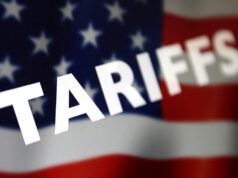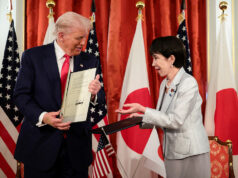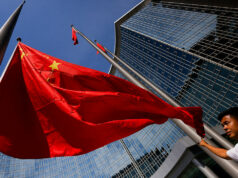BERLIN — Germany looks set to hold its federal election on Sunday Sept. 24, with Chancellor Angela Merkel seeking a fourth term in office and the anti-immigrant Alternative for Germany party expected to enter the national parliament for the first time.
Government spokesman Steffen Seibert said on Twitter that the Cabinet had suggested that date to the President, who has the final decision but tends to agree with the government’s proposal.
Ms. Merkel faces a tougher re-election campaign than previously after allowing more than a million migrants from the Middle East, Africa and elsewhere to enter the country in the last two years.
Concerns about integration and security have pushed her popularity down and fuelled the rise of the anti-immigrant Alternative for Germany (AfD) party, which is expected to win enough votes to clear the 5% threshold to enter the federal parliament.
A poll by Forsa for German magazine Stern published on Wednesday put Ms. Merkel’s conservative bloc — her Christian Democrats and the Christian Social Union, their Bavarian sister party — on 38%, up one point.
The Social Democrats (SPD), junior partner in the ruling coalition, also edged up by one point to 21% while the AfD shed one point, falling to 11%.
The head of the Forsa opinion research institute which conducted the poll, Manfred Guellner, said a jihadist attack on a Berlin Christmas market last month that killed 12 people and was committed by a rejected asylum seeker had failed to boost support for the AfD.
“Although the security debate after the Berlin terror attack is running high, the AfD is unable to capitalise on it,” Mr. Guellner said in a statement.
“It is actually losing support while the CDU/CSU and the SPD are stabilizing.”
RADICAL SURGE
The AfD, born as a eurosceptic party in 2013, has attempted to harness public unease with migration and asylum and, due to its relative strength, threatens to scramble the potentially complicated arithmetic of coalition building after the election.
It hopes to become the first populist party to gain seats in the Bundestag lower house of parliament in post-war Germany.
The AfD, seeking to gain momentum from a surge of European radical parties, will host a meeting of far-right leaders in the western city of Koblenz on Saturday.
Leaders expected to attend include Marine Le Pen, the presidential candidate for France’s National Front; Harald Vilimsky of Austria’s nationalist FPOe party; and Dutch MP Geert Wilders of the anti-Islam Freedom Party (PVV).
The Forsa poll, conducted Jan. 9 to 13 among a representative sample of 2,053 eligible voters, showed the ecologist Greens and the far-left Linke each at nine percent and the pro-business Free Democrats at six percent.
The Greens, who have been mentioned as potential partners in government for Ms. Merkel after the election, on Monday chose two members of their pragmatist wing, Cem Ozdemir and Katrin Goering-Eckardt, to lead the party into the general election.
Both have praised Ms. Merkel’s stance on refugees.
However, Ms. Merkel has faced blowback from within her own conservative bloc, with the Christian Social Union in the southern state of Bavaria agitating for an upper limit on new asylum seekers — a bid Ms. Merkel has repeatedly rejected.
US president-elect Donald Trump said in a newspaper interview Monday that Ms. Merkel had made a “catastrophic mistake” in letting migrants flood into Germany.
Yet some analysts say German uncertainty over the future of the post-war order with Mr. Trump at the helm in Washington and Britain leaving the European Union could help Ms. Merkel’s campaign as voters long for stability. — Reuters and AFP



